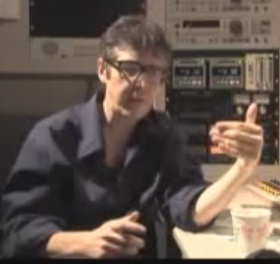
Thank you, Ernie Easter, for the lead on this series.
This American Life
Part #2
Part #3
Part #4
I wish, too, that we had an Acceptable Use Policy for Educators - not for how they use it personally, but how they use it with their students.
I wish that AUP would focus on things like teachers promising that they would use the laptops to
- do projects
- promote curiosity and make content interesting
- build constructive conversations and debate
- open the world to students, taking them where they've never been before
- bring experts into the classroom, regardless of where they are geographically
- improving writing by finding what kids would love to write about
- make complex ideas concrete and understandable
- teach responsibility by giving students responsibility and finding out their questions & concerns about their world & work
And I wish that AUP would prohibit (or at least severely limit)And I wish that AUP generated as much conversation about consequences of violating the AUP as the one for kids does.
- not using the laptops
- locked down machines
- strong filtering
- electronic worksheets
- simply looking up facts on the Internet (or worse - calling that a WebQuest)
- using laptops as a textbook
- drills for learning software programs
"Respect for students starts with respect for teachers, for them as individuals, for their work, and for their workplace." ~ Ted SizerThe Educational Theory of Theodore Sizer
"The best we educational planners can do is to create the conditions for teachers and students to flourish and get out of their way." ~ Ted Sizer

 I was thrilled to catch a post from Kim Hilton in the Mountain Valley Middle School First Class conference this morning. Being a proponent of the simplicity and utility of wikis, I was delighted that Kim had just set one up, called MVMSAdvisor, for resources in their advisor/advisee program.
I was thrilled to catch a post from Kim Hilton in the Mountain Valley Middle School First Class conference this morning. Being a proponent of the simplicity and utility of wikis, I was delighted that Kim had just set one up, called MVMSAdvisor, for resources in their advisor/advisee program. Melissa Prescott, an art teacher at Telstar Middle School, has created the following blogs using WordPress:
Melissa Prescott, an art teacher at Telstar Middle School, has created the following blogs using WordPress:
 by Sarah Sutter
by Sarah Sutter by Mary Ellen Bell and Sarah Sutter at Maine Ed 09. Links to tools and ideas for creating oral history projects, a great interactive immigration map, ideas for using Google Maps collaboratively and more. The slide show is there, as is a link to the recorded presentation from the Spring MLTI Online Conference last May.
by Mary Ellen Bell and Sarah Sutter at Maine Ed 09. Links to tools and ideas for creating oral history projects, a great interactive immigration map, ideas for using Google Maps collaboratively and more. The slide show is there, as is a link to the recorded presentation from the Spring MLTI Online Conference last May.
